- Why a netbook is often called a compact laptop
- Laptop and netbook portability
- Notebook and netbook specifications
- Laptop and netbook keyboard
- The difference between laptop and netbook software
- The price of a laptop and netbook
- Design features and limitations of the netbook
- When a netbook is irreplaceable
- When using a laptop is preferable

Laptop pc
Not many users understand the intricacies of laptops. And coming to the store, they are often lost in a large assortment of such gadgets. Consider the difference between a netbook and a modern laptop and which is better.
Why a netbook is often called a compact laptop

Difference in size
The word "computer" has ceased to be associated with a bulky unit more than thirty years ago, and in the structure of electronic computers there is a tendency to minimize dimensions.
To carry out various operations with data, their databases became necessary on the go, without constant reference to the place. So there were laptops, and after them - similar netbooks. The vocation of both is the creation of comfortable working conditions anywhere.
Gadget designs are similar. A thin display, hinged to the system unit with a keyboard, allows you to fold the device in half, as if closing a book. When closed, both devices are protected and integral. But most importantly - these computers are portable, but the laptop is slightly larger.
A modern laptop has the same components as a netbook:
- microprocessor;
- optical drive;
- keyboard layout
- HDD;
- random access memory.
A bonus is the ability to take the device with you on nature, on a business trip or on a visit.
A netbook similar to a laptop is only inferior in size. Netbook display diagonal can reach a maximum of twelve inches. A smaller screen was followed by the minimization of component sizes. This makes the portable PC extremely convenient. Thanks to the small size, the netbook is called a compact laptop.
Laptop and netbook portability
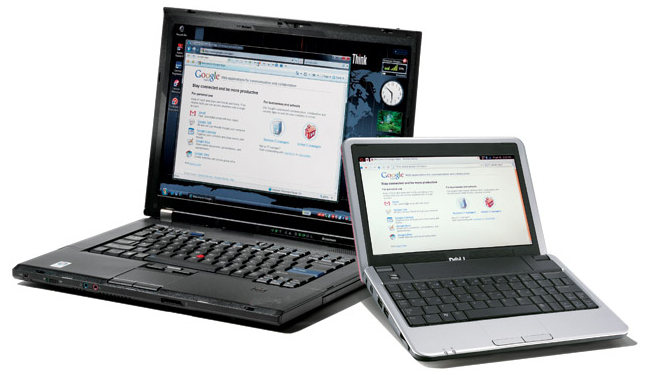
Identical screens
Previously, about ten years ago, the only advantage of laptops over desktops was the convenience of taking with them. Now, with equal opportunities, this characteristic is also an indisputable advantage. Compactness is the main criterion that must be taken into account.
The portability of these computers is due to:
- continuous configuration - the display is connected to the system unit;
- small size - the size of the netbook is quite similar to the average book;
- battery - for a short period of time, you can use the device without connecting to an electrical network.
Technology does not stand still. It sounds corny. But the fact that the thickness and weight of the gadgets with each version is becoming less and less is pleasing to remote workers. Computers can be taken with you to a cafe, to a hotel, at a conference, or even to work outdoors, without feeling any discomfort while moving equipment.
Notebook and netbook specifications
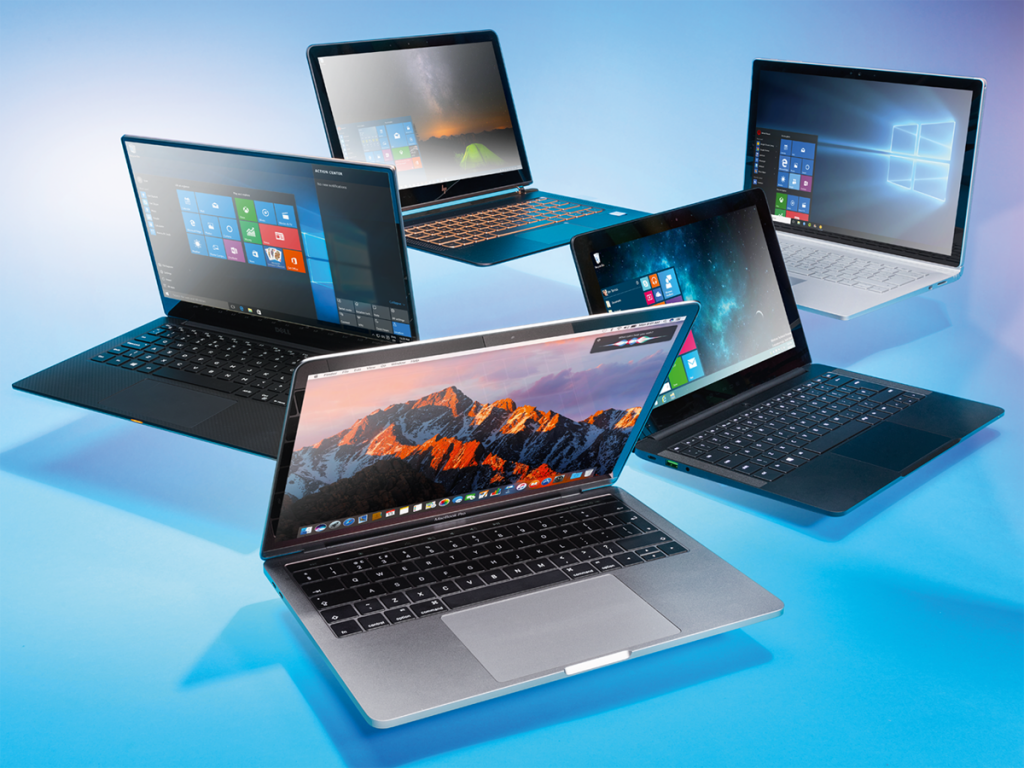
Different PC models
No matter what dimensions the gadget has, when choosing a device, technical characteristics will definitely come first. It must be borne in mind that in any case, the performance of laptop computers will be lower than that of stationary PCs.
To minimize the size, the frequency of the microprocessor, the amount of permanent and RAM memory, etc. are sacrificed. All these “cuts” are justified by small dimensions and the main goal is to perform additional work.
The heart of any computer is the processor. Modern PCs have quite capacious devices from Intel. The microprocessor frequency can reach 4 GHz - a fairly high figure. The only restrictions are there to reduce power consumption. The disadvantage of this technical solution is the inability to work with voluminous software.
It should also be borne in mind that netbooks do not have powerful graphics cards. Designers and video correctors, gamers and photographers will never choose it for themselves, since these devices have a poor quality controller. When it comes to laptops, some models are not inferior to professional "staffers" and are able to pull the brightest games of the latest generation.
The difference in the amount of RAM between personal computers and laptops is small, indicators reach 8 GB. True, the PC can be expanded with the help of additional boards up to 32 Gigabytes. Netbooks cannot boast of such features. The maximum amount of RAM is 2 GB, which is enough to work on the Internet, with office programs.
Laptop computers often use SSD hard drives. Netbooks have a maximum hard drive of 200 GB, while laptops can accommodate up to 2 terabytes. Such characteristics come from the purpose of the device. For remote work, you can always use cloud storage. In this case, the on-board memory is entirely sufficient.
In addition to the main parameters, both gadgets are equally endowed with wireless means of communication:
- Bluetooth
- Wi-Fi
- NFS and more.
On the case, in any case, there will be third-generation USB ports, HDMI connectors. For interactive communication, a WEB-camera is mounted at the top of the screen, although the resolution is rather low.
The separate capacity of netbook displays compared to laptops and PCs is low. Having a diagonal of 12 inches, the monitor produces a picture of 1920 by 1200 pixels. The basis of the screen is the IPS matrix. Powerful laptops boast a full 4K display. It follows that the performance of additional work is quite comfortable on a netbook. But watching movies, high-quality video is difficult not only because of the small screen, but also a weak video card.
The sound made by both gadgets is unlikely to appeal to music lovers, so you can’t do without additional acoustic equipment. The built-in sound card has undergone trimming, and in the small case of the netbook there is no room for powerful speakers. In turn, some laptops may have good enough sound. But this is not the main technical condition when choosing a device. Moreover, there are linear audio outputs on the case, which allows you to connect speakers, a headset.

Comparison table for netbook and laptop
Laptop and netbook keyboard
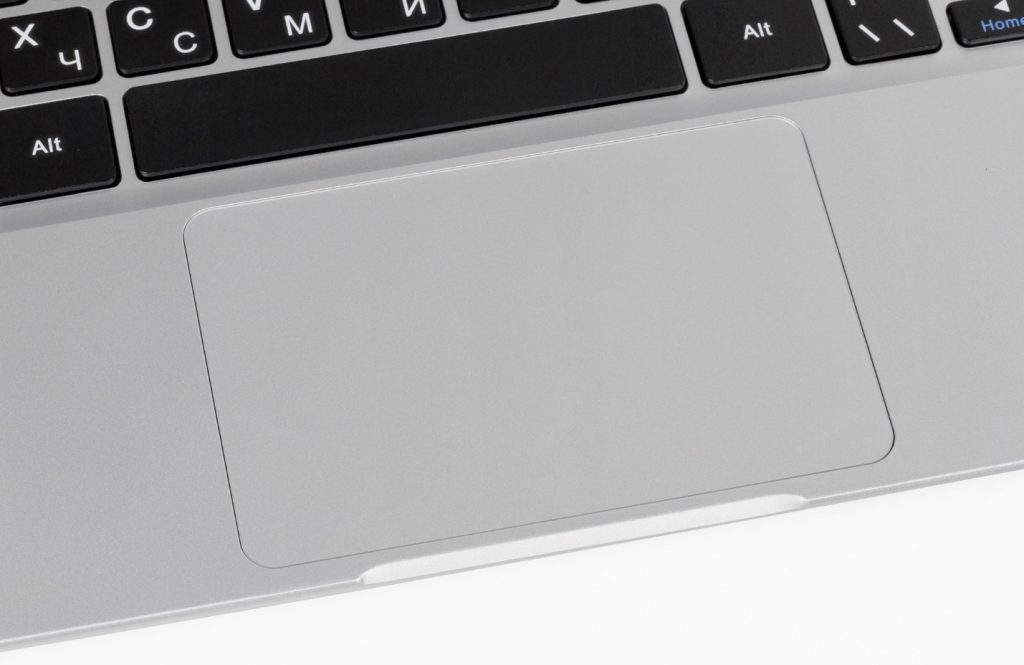
Touchpad on laptop
The keyboard of the devices is entirely proportional to the size - the larger the diagonal of the monitor, the more complete the layout. But the basic set of keys remains unchanged on both devices. You will find the necessary buttons on any device. Quantitative reductions apply only to additional keys.
Laptops, as the larger brothers of netbooks, have a full digital, alphabetic layout - plus additional sets of buttons for games, quick access, and display orientation. Optional digital dialing equipment is also possible.
The total number of buttons on the laptop can reach one hundred and twenty pieces, while the entire set of the usual keyboard of a personal computer is saved.
The size of the keys, the distance between them quite helps typing large text without difficulty. And gamers will appreciate the typing tool on laptops with a diagonal of more than twenty inches.
Netbooks also have a slightly truncated keyboard, and the most frequently pressed key will be “Fn” - a change of functions - because often there are several tasks assigned to one button.The number of keys barely reaches eighty. The small size of the case provokes the deprivation of an additional digital layout, shortcut keys and device control.
The buttons themselves are small, densely arranged relative to each other. This all provokes difficulties in typing large texts, but it is quite acceptable for short correspondence. A disadvantage can also be the inconvenience of working in programs that require entering commands from the keyboard. Excel with its formulas or Photoshop is extremely undesirable for a netbook.
The difference between laptop and netbook software
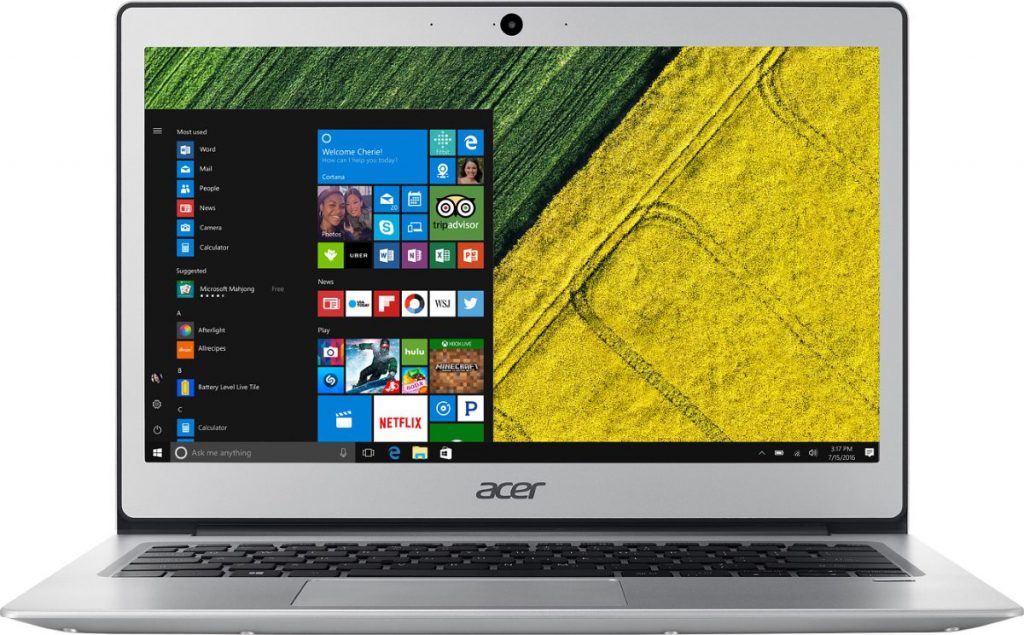
Programs on the PC screen
Notebook operating systems are no different from PCs. Depending on the technical specifications, you can put any desktop version of Windows, iOS or Linux on the laptop.
The same applies to other software:
- text editors;
- Photoshop
- audio and video converters;
- browsers;
- specific programs.
Regarding netbooks, there are limitations for software. Low performance indicators are not suitable for ordinary modern versions of Windows, so the "cropped version" of the OS is used.
Using Linux is widespread, but for inexperienced users this can be difficult. In addition, there may be inconvenience with the synchronization of machines on different operating systems.
Among other things, the application store is significantly limited. Software developers are not particularly keen to meet the demands of netbook users. They understand that someone will hardly need a “defective” program. But do not be upset. There are online versions of most programs. In addition, the gadget can easily perform certain tasks using a browser.
The price of a laptop and netbook
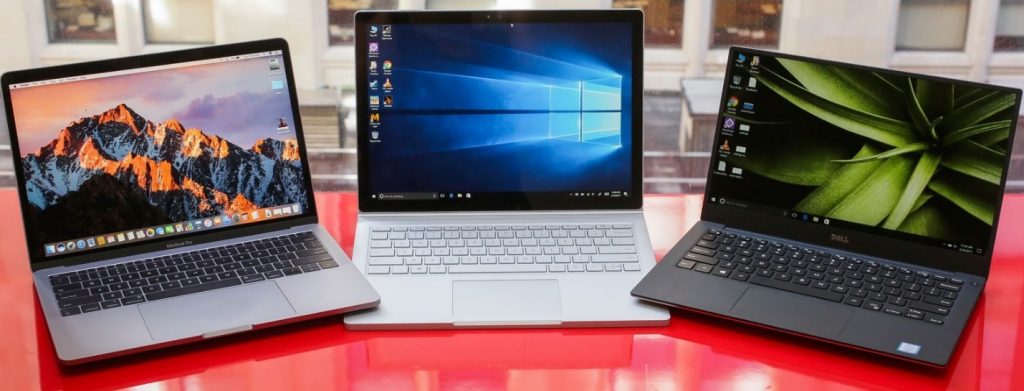
3 different laptops
The basis of pricing for portable devices is the functionality, size, material of the product. But smaller netbooks are cheaper than laptops. Price range from 300 to 700 US dollars. This is due to the small size, the lack of some functionality. The price of laptops starts at $ 400, but there is no extreme value in a big way. Total netbook average performance will cost less than a "weak" laptop. When buying a particular gadget, orientation, in any case, goes to the fulfillment of tasks.
Design features and limitations of the netbook
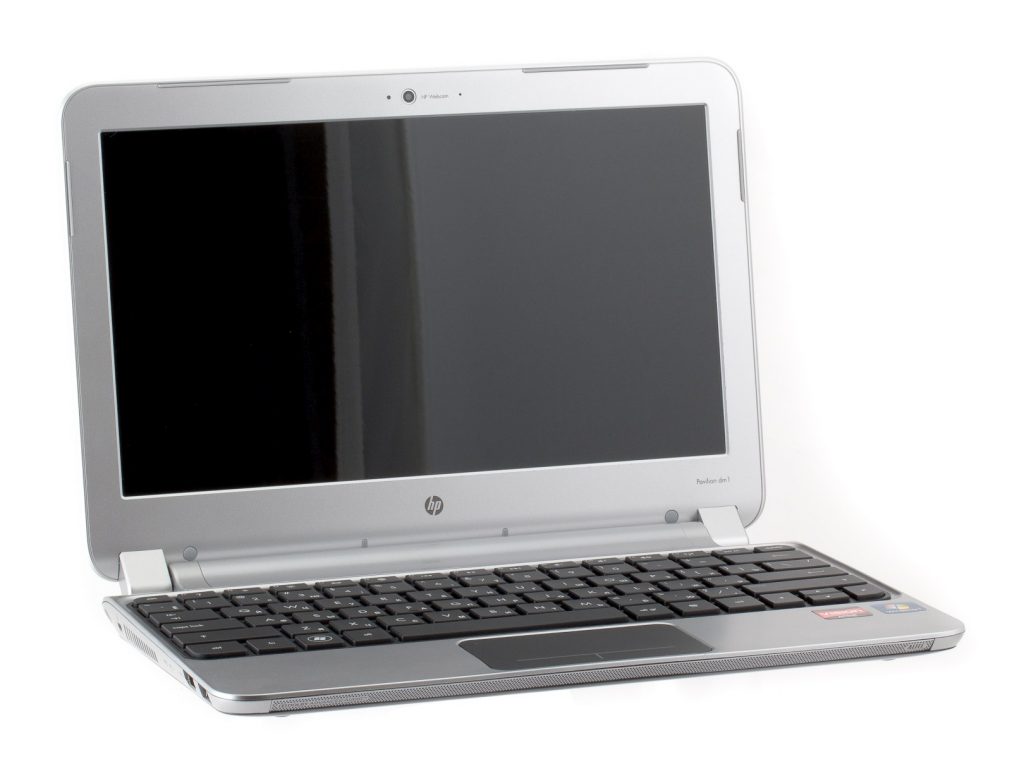
Small gadget
The maximum possible reduction in the size of the netbook, entailed the deprivation of the device additional functions. The most noticeable difference between a netbook and a laptop is the lack of an optical drive. So the use of DVDs or CDs is not possible, but with the fading into the background of such storage devices this does not seem to be a big problem. For a long time flash drives, removable hard drives flooded the storage market, and the installation of software and the operating system is possible using USB-drives.
Another feature is the long battery life. Without capacious programs, energy-consuming hardware, and a small display, the netbook works at least twice as long as a laptop. On the one hand, this advantage would be impossible without the disadvantages - low performance, small screen, defective operating system.
But, in addition to a laptop and netbook, on sale you can find more advanced portable equipment - ultrabooks. Regarding the difference between these gadgets and ultrabooks, the first, first of all, is much thinner. It is lightweight, very productive, but it costs a lot more.
When a netbook is irreplaceable
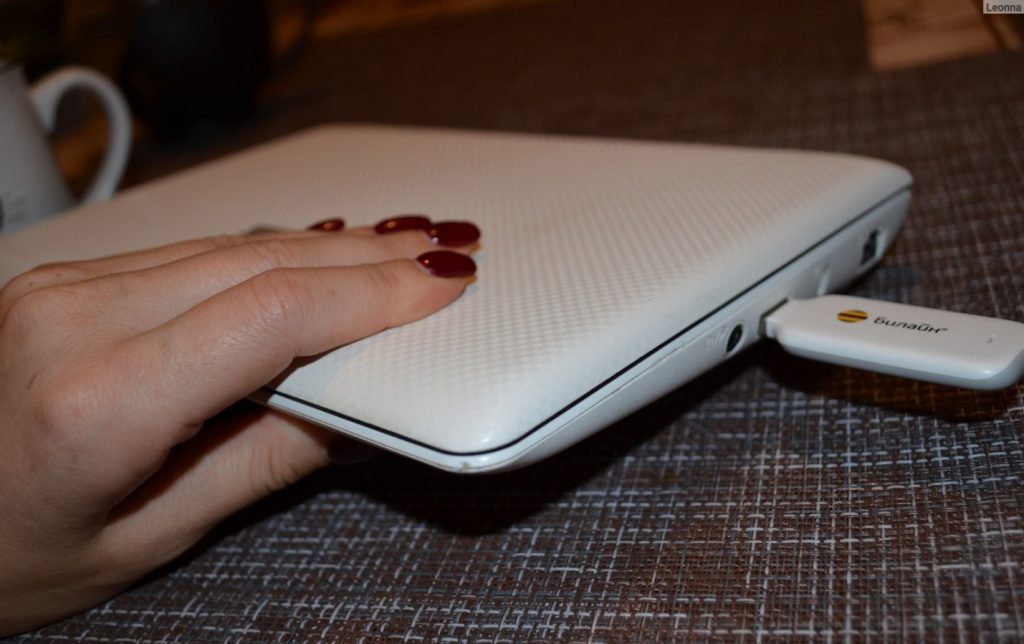
White gadget
In the case when you are faced with a choice, it is worth evaluating the tasks that you set for the gadget.
For regular travelers, when the quantity and volume of cargo is constantly calculated, it is better not to find a netbook device. Another aspect of its indispensability is speed.
Unloaded with a large volume of software, the gadget will load faster, open installed programs, and perform other computing operations.
All design features of the netbook are aimed at the quick execution of tasks by performing a minimum number of manipulations.
In fact, a netbook is tablet with keyboard. Some manufacturers of gadgets (for example, Lenovo) create touch displays, and the keyboard is in addition to working with texts or for the convenience of correspondence.
This device is also necessary for long battery life - a hardy battery will provide at least six working hours without connecting to an electric network. This time is enough to conduct a full-fledged online conference or remote work.
The third point that makes the gadget indispensable is its price. If you are limited on a budget, it would be better to purchase a powerful netbook, unlike a similar-priced but inferior laptop. With its help, it will be possible to carry out a large amount of work with data through cloud storage or online.
When using a laptop is preferable
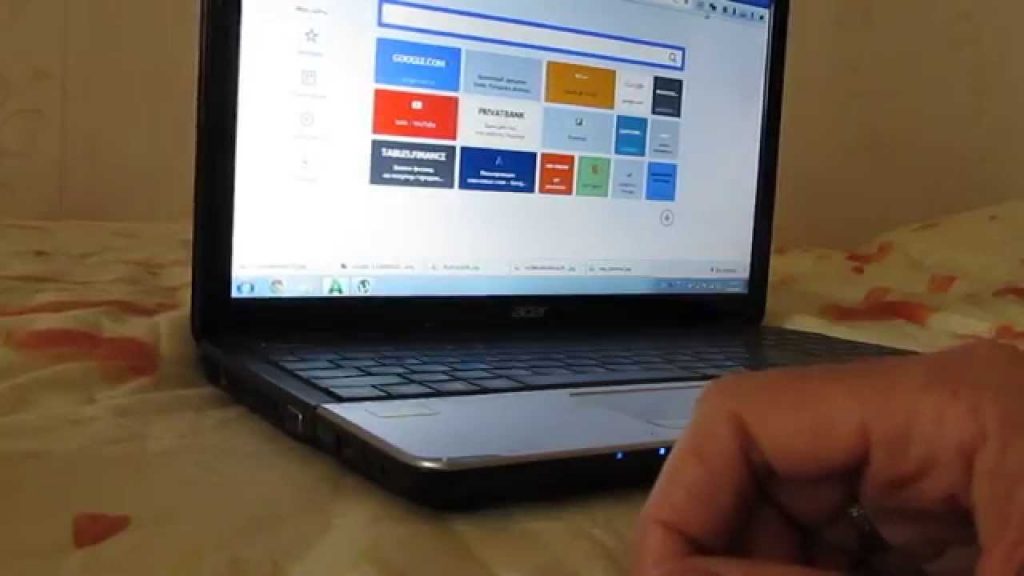
Using computer technology
In the case when for some reason it is necessary to carry out large volumes of work away from the office and in the "field" conditions, then you can not do without a laptop. Functionally, it is not inferior to stationary computers, and the main one is more convenient. After all, the user is not tied to one place.
Comfortably sitting on the couch or in the park, you can:
- type large texts;
- edit images or videos;
- create databases and so on.
In addition, by purchasing a widescreen laptop, you can enjoy watching movies while lying in bed.
In the case when you perform a large amount of computing work in comfortable conditions, without limiting yourself in functionality, the laptop looks preferable to a netbook. The only drawback will be the high price compared to a personal computer.
In the past few years, the demand for laptop computers has surpassed the demand for stationary computers. Connoisseurs of minimalism turn their attention to netbooks, and lovers of freedom - to laptops. Only with the latter you can feel the comfort of movement without sacrificing performance. On a laptop it’s convenient to demonstrate photo or video presentations, and by connecting a projector to it you can hold seminars or conferences. Thanks to these features, this gadget is very popular among students - moving from audience to audience is easier to carry a laptop, all the information is at hand.
 What to do if the keyboard does not work on the laptop
What to do if the keyboard does not work on the laptop  Why is the battery indicator on the laptop blinking
Why is the battery indicator on the laptop blinking 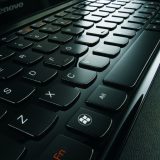 Lock and unlock the keyboard on laptops of different brands
Lock and unlock the keyboard on laptops of different brands 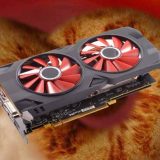 How to check and test a video card on a laptop
How to check and test a video card on a laptop 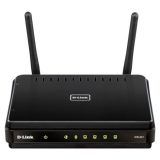 Why the laptop does not connect to Wi-Fi
Why the laptop does not connect to Wi-Fi 

